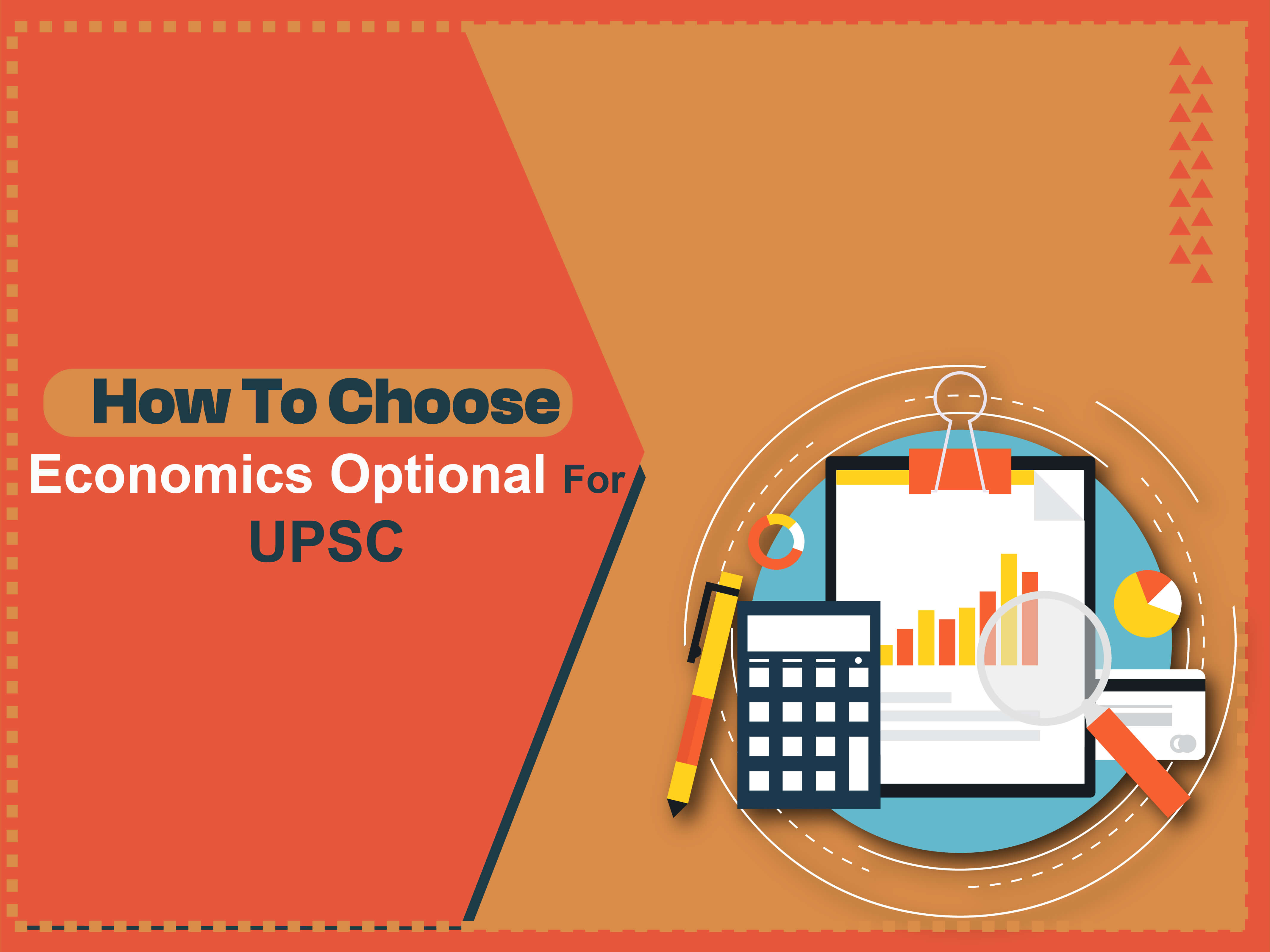
How to Prepare Economics Optional for UPSC
When it comes to Preparing for UPSC , the fight begins with choosing your optional subject. If you are curious about how economic phenomena come into being, then Economics could be an extra subject for your studies. This article will walk you through a simple, accessible, step-by-step process on how to prepare for Economics.
- 1
Understand the Syllabus:
Before diving into your preparations, you must first clearly understand the UPSC-prescribed syllabus for Economics optional. The syllabus reminds you which questions to answer and on what topics. Survey the different parts, such as Microeconomics, Macroeconomics, Indian Economy, and International Economics.
- 2
Choose the Right Study Material:
Choosing the best study material is very important for preparation. So that you won’t miss any relevant topics, stick to the recommended books and study materials. Some widely used textbooks for Economics optional include:
- Microeconomics by H.L. Ahuja
- Macroeconomics by H.L. Ahuja
- Indian Economy by Ramesh Singh
- Paul Krugman and Maurice Obstfeld’s International Economics
- Development Economics by Debraj Ray
- 3
Build a Strong Foundation:
Start with the basics. Economics is certainly not an easy subject, and laying a good foundation matters. Read some easy beginner’s books to study the concepts, then progressively more advanced ones. To pursue more advanced and specialised branches of economics, such as development economics or international economics, you must necessarily first master the basic theories underpinning microeconomics and macroeconomics.
- 4
Create a Study Plan:
Establish a firm study routine with your complete plan. Set aside enough time to work to study sections of the syllabus. This will help you to cover all topics in some detail. Divide your studying into small bits so you can revisit them often. The most important aspect is consistency, so stick to your schedule and adjust as necessary.
- 5
Previous years ‘question papers for practice:
Practising with previous years’ question papers can assist in preparing for the UPSC Economics optional. This also introduces you to the exam format and gives you an idea of how questions are formulated. Examine the questions to find common themes and prepare accordingly.
- 6
Focus on Conceptual Clarity:
UPSC is famous for testing candidates on concepts rather than the ability to rote. As you study, try to grasp the basic principles and theories. Rather than the definition, concentrate on how economic concepts apply to real-world situations. This method will not only help you in the examinations but also take you deeper into the subject.
- 7
Diagrams and Graphs Can Be a Big Help:
Economics is usually accompanied by diagrams and graphs that explain things. These diagrams and graphs can be practised as one will present answers in the exam. Not only does a well-drawn diagram make your answer look prettier, but it also shows that you have a good hold over the subject.
- 8
Stay Updated on Current Affairs:
Economics has always been a rapidly changing area of study. One should keep up with the industry trends. Following major newspapers, magazines, and web-based media can help one to become acquainted with the news. Both local and international news is necessary. This knowledge doesn’t just make for better answers but also shows your awareness of contemporary economic problems.
- 9
Utilise Technology and Online Resources:
In this digital age, technology can be your good friend in preparing for UPSC. Bolster your traditional study materials with online resources such as educational websites, video lectures, and podcasts. Several websites, such as Khan Academy and Coursera, offer a wealth of resources teaching diverse economic concepts. Online platforms provide interactive learning, allowing even complex topics to be made interesting.
- 10
Develop Analytical and Writing Skills:
UPSC examination is comprised of successfully writing the answers as they need to be written. Work on your essay writing skills, and try to express yourself clearly and succinctly. Do some work on adopting a clear writing style that helps to elucidate such abstract economic concepts in a digestible fashion. Also, improve your analytical skills by evaluating economic policies and their consequences in a critical manner. An ability to analyse and neatly present one’s argument is a useful asset in the examination.
- 11
Staying Healthy and Managing Stress:
Regular exercises and meditation contribute toward better health. UPSC Preparation takes a lot of work. Hence, managing stress is an important task. This directly influences one’s ability in life to perform at an optimal level. Concentration levels depend on how healthy the person is mentally. Prevent stress from creeping in by maintaining a healthy mindset throughout your studies. Try out some brain improvement techniques like meditation or yoga. Also, consuming low-sugar food and eating more whole food is important in one’s diet.
- 12
Revision is Key:
Before the UPSC examination, set aside a large amount of time for revision. Review what you’ve learned periodically to deepen your understanding. The notes should be concise, pointing to important points and formulas. Then it is easier to study closer in time before the exam. A clearly defined revision plan will help you to remember what you have learned and your confidence in being able to cope with any question thrown at you.
- 13
Form a Study Group:
You could get together with other UPSC contenders who have elected Economics as their optional subject and form a study group. You can get different views, clarify doubts, and learn new study techniques in group discussions. Teaching and explaining concepts to others can deepen your understanding of them, as well as reinforce your knowledge.
- 14
Use Mnemonics and Memory Aids:
Economics requires you to remember a variety of terms, concepts, and formulas. Use mnemonics and memory techniques to make memorisation easier. Think up acronyms, rhymes, or associations that will help you remember what to write during the examination. This technique is especially handy for remembering complicated economic theories and models.
- 15
Stay Adaptable to Exam Changes:
The exam pattern or the syllabus may change by UPSC. Keep track of any updates released by the UPSC and make adjustments to your strategy accordingly. Be flexible enough to add new topics or change your study plan following the most recent requirements. Awareness of changes will leave your preparation current and relevant.
- 16
Incorporate Real-life Examples:
Economics isn’t just theory; it is practical. Add attention-grabbing examples from contemporary economic life to enrich your answers. This not only represents a practical grasp of the subject but also displays your ability to apply economic concepts in daily life. UPSC looks for candidates with the ability to apply theory to practice.
- 17
Glean Strategies from Toppers ‘Review and Learn:
Discover the tips and ideas of previous UPSC toppers on Economics as their optional subject. Know their study habits, timing tricks, and ways to deal with different parts of the paper. You can gain much from studying the experiences of successful candidates; such a study will provide you with valuable insight and inspiration on your journey.
- 18
Seek Feedback on Your Answers:
Routinely ask mentors, teachers, or peers for feedback on your practice answers. Negative criticism will tell you where to improve your writing style or the presentation and depth of content. Systematically go through the feedback to improve your response technique and the quality of your answers.
- 19
Develop a Revision Strategy:
Besides studying regularly, you have to come up with a systematic revision plan as the exam approaches. Know your ground. Take into account the relative importance of certain topics in past exams, and concentrate on areas where you feel less secure. Bullet-point your revision notes and make flashcards to speed up reviews. With a well-conceived revision plan, you can go into the exam knowing that your preparation is complete and feeling very confident.
- 20
Simulate Exam Conditions:
Practice taking papers and answering questions under exam-like conditions. Turn on a timer, keep to the required word count, and try your best to recreate an actual examination environment. This not only helps you schedule your time well but also reduces anxiety and raises your performance in the actual exam.
- 21
Stay Positive and Manage Stress:
Always keep a positive attitude during the journey of preparing for UPSC. Recognise how far you have come, and keep working on further improvement. While dealing with the high pressure of exams, learn to remain calm. Practising mindfulness is one of the dress management techniques. To be a better person overall, a good attitude towards life is necessary.
Conclusion: Navigating Economics for UPSC
To sum up, doing well in UPSC Economics requires selective studying with a real interest. Draw up a personalised study plan, stay in touch with current economic developments and always reflect on your performance. Besides simply memorising things, grasp the basic concepts and apply economic theories to real-life examples. See this challenge as an adventure, one with no limits beyond the exam room. But this approach not only increases the chances of success, it also provides a useful analytical perspective on economic matters. Good luck on your journey to UPSC glory!






